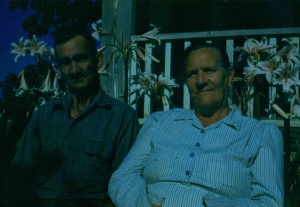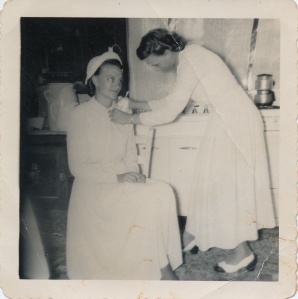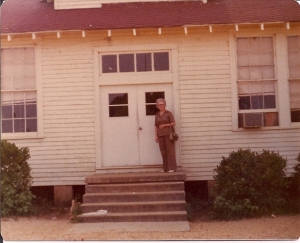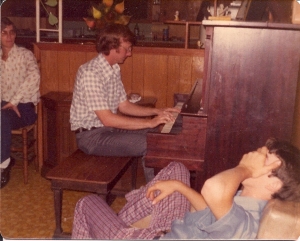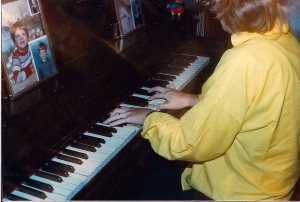Once more I prepare to spend a Sunday morning at the only local bar, working the 88 keys of a piano donated for public use after I have enjoyed a meal fit for a fine restaurant. Filled with locals, few of whom I yet know by name, this place offers more healing than I had expected, easing the tendrils of my life with the piano into wholeness. Far too long for a single blog post, I intend to tell it here as a string of them. On the Sundays I play. Until the telling is done.
Part One: Mammaw, Mama, Mrs. Jessie Toney, and Mr. Jackie McGee
I owe my ability to play the piano to four women and four men. My mother’s mother was the one with the vision for our family: in the early 1940s, she bought an upright player piano for her twin girls and paid for lessons as well.
My mother and her sister took to the player part of the piano quick and easy but were not at all enamored with the lessons and practicing that would get them beyond the basics without the help of that doctored piano roll. So Mammaw did what any reasonable woman would do: took the guts clear out of the piano then, figuring that if her two hardheaded girls didn’t have that mechanism to fall back on, they’d have to learn to play themselves. Mama got as far as Sweet Hour of Prayer, Love Lifted Me, and one memorable duet with her twin before they both gave up and went on to more rewarding activities.
The piano sat against a wall of my grandparents’ home until I came along and, as a small child, expressed an interest in it. Mammaw gave it to us, Mama and Daddy toted it home and into our house, Mama had a man repair and tune it, and there it sat. The biggest thing in our living room and the biggest promise in my world. When I reached fourth grade, Mrs. Jessie Toney would accept me as a student.
Mrs. Toney taught music at Jones Elementary and after school she taught piano. The school had invested in a baby grand for the stage where our recitals were held, but we took our lessons in a small room to the right on a floor level with the audience and on three upright pianos in a space with barely enough room to turn around otherwise. Mrs. Toney was tall, drop-dead gorgeous, and had the bluest white hair I’d ever seen. She dressed as if she was being invited to the governor’s mansion every day—so impeccable, in fact, that I used to wonder if she was the reason English had that word in itself—and she carried a long wooden stick pointer with a black tip on its end that she used to get our attention from a ways away. There was a narrow lane behind our benches and the wall. Mrs. Toney and her pointer patrolled us from there, close enough we could feel her breathing when she passed.
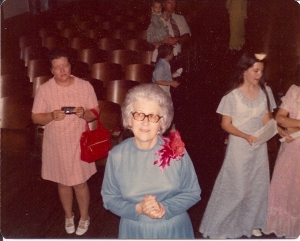
Mrs. Jessie Toney, at the front of the auditorium in which we did our recitals. I’m taking the photo from the stage.
I loved the piano. Loved it. Slept it, dreamt it, banged on it for years leading up to my first actual lesson. Music theory? Not so much. Mrs. Toney expected one hour of practice every day, she informed us (and our mothers), and my mother set about complying. The thing nobody tells you about good music instruction is that the ramp-up takes some time. You don’t just show up and start belting out tunes. Mrs. Toney wanted us to read music, understand music, write music, breathe music, and then play it well: pretty much in that order. I just wanted to play and well was not then on my radar. Mama went with Mrs. Toney on things and, in a very odd pattern untrue for any other subject I ever studied, involved herself in my lessons and the written record I had to keep of my practices.
From the start I could pick out tunes by ear and this was a fine thing, it seemed to me, but Mama wanted me to practice the lesson material. For a few days, perhaps a week, I tried that, and it was the equivalent of raking my inner ears with teaspoons. Dreadful. So I would bang on the keys and then quit. Mama reasoned with me. She showed me the innards of the piano (long gone, for cause) and how she could only play three songs now because she didn’t practice when she had the chance. She told me that her own Mama had let her quit lessons and that she herself deeply regretted this and, for this reason, she was determined that I would not quit. I’d listen, feeling her deep feeling about this and the seduction of possibly one day making the piano sing, and then I’d give it a go, but nothing sounded good and I would get frustrated and then annoyed and flounce off. Pretty soon Mama would say, “You can either finish that lesson or go get me a switch.”
And off I’d flounce to one of the crepe myrtle bushes and pick a switch, stripping the leaves off it on my way back into the house, handing it to my mother in the utility room, and taking my licking with a stiff upper lip. Then I’d go back and finish practicing, but I made up my mind that I wouldn’t learn the theory part. I would pretend to do that, but really just ignore it. Once I’d done this on two straight days in a row, Mama and I were locked in. For the next six months or so, this was the pattern of our late afternoons. I’d have to be called in from the back forty to practice, I’d dawdle on the way, I’d play hard on the pieces I had picked up by ear but then turn to the required lessons and get mad and quit a few minutes in. Then I’d stomp out for a switch and hand it over, take my lickin’, finish my practice, and scribble it down in my tablet with enough force sometimes that the paper gave way entirely.
Lest you feel sorry for me, let me be clear. A switching in such circumstances didn’t hurt. It’s all theatre, a morality play which everyone understands. And values, to some extent, no matter what role you’re playing in it. My switchings (Mama called them whippings) took place in the small utility room, already filled to the gills with a full-sized chest freezer, washer, dryer, and all our boots and coats. There was barely enough room to turn around, especially on days when Mama was baking pies and cakes for some gathering and had all horizontal surfaces covered with good eats, but I was skinny and Mama was, too, and I decided on day one that I would run around her while she switched. We wore long Pentecostal skirts as well, so the only way to actually connect with skin was to make me stand still and hold those skirts up. Mama never did that over piano practice: serious whippings like that were reserved for times when I did something actually mean, like try to brain a city cousin with a hoe. (He started it by using said implement to slice open a baby turtle’s back so, as I saw it, he had something similar coming and I was more than willing to provide it. Which, in fact, did count as worthy of an actual whipping.) The piano practice ones, by contrast, were almost choreographed. Mama would start switching and I’d start running around her and pretty soon she’d get dizzy and call it done. I would then go back to the piano and actually practice. Neither of us had the moral high ground, but both of us took it anyway. If Mama had quit then, I’d never have touched the piano again. Knowing this, she didn’t quit.
The shift came in the late spring when Mrs. Jessie Toney figured out my pretense regarding the sight-reading. She was all the way at the end of the three pianos when I played the piece she’d asked me to play. When I finished, she paused a couple seconds and asked me to play it again. The music was propped up in front of me, and I plowed back into the piece with verve. But then Mrs. Toney asked again, in a lower, firmer tone, and stretched the tip of that pointer out so that it sat ever so gently on my shoulder (with her still what felt like miles away). My fellow students sat on their benches staring at their pianos, necks probably registering that long slender pointer behind them and minds glad it wasn’t their turn. I stared at that sheet of music, knowing full well that I was missing something, that somehow when Mrs. Toney played the piece for us the week before I’d missed a note or maybe even more. I didn’t know, because I couldn’t read music. I’d parsed out all the theory in my head so I didn’t have to learn it and the stubbornness had trumped all my ‘studies.’ By the time I’d finished the third go-round, Mrs. Toney was standing at my back. By the time I’d started the fourth, she was standing in my line of vision on the right side. Right at the top of the 88 keys. With the pointer in her right hand and its nose on the wood floor beneath our feet.
When I finished, she said, “You can do that then.” I knew what she meant but wasn’t about to admit it yet, so I said nothing. She nodded that blue-white hair and put the tip of the pointer on the music to the note I’d missed. “Play this note.”
Well, I couldn’t, so that was just that. I had so thoroughly resisted knowing anything she’d taught me theory-wise that I couldn’t even count up from middle C and find the note. (I could and did, however, test at 100 percent on her written theory tests every week, a fact that has ever since played an enormous role in my utter disdain for tests as measures of knowledge or anything else.) “So you can do that—hear me play it and then play it yourself?”
“Yes, ma’am.”
“And that’s how you’ve done this all along? Even for your two recital pieces?” (We’d had one recital by then and were preparing for the second, and I’d faked them both. She played all our pieces for us on the day she selected and handed them out. I memorized the ones I liked and my own. Nobody had ever figured out. I had truly believed they never would.)
I nodded, fairly miserable but most concerned—nearly obsessive even—about that one missing note. If my whole life had depended on it then, I wouldn’t have been able to find it. Mrs. Toney said something along the lines of “It really bothers you that you don’t know what note I’m talking about, doesn’t it? That you don’t know enough to find it and fix it?”
And I said something along the lines of “Yes, ma’am.” And meant it.
“I will never play another piece for you again. As long as you are my student, you’ll have to learn your pieces from the page.” And that was that. She dismissed class and I marched out to the car to meet my mother.
On the drive home I didn’t say much. I sure didn’t inform Mama about what had happened. In recent weeks, I’d taken to the habit of crawling out of the car and stopping by the crepe myrtle bush for my switch before I even went in the house—stretching the pathos of the unjustly-treated child way past its normal limits. I’d lay the long thin branch on top of the piano and, when I got tired of playing the pieces I had learned by heart, I’d quit and take it to Mama. This day I didn’t go near a crepe myrtle, just headed up the steps. Mama noticed. She stopped right in her tracks. “Are you feeling sick?” was all she said.
“No, ma’am.”
I sat myself down at that piano and practiced—theory and all the sight-reading from Lesson One on (including every last one of my 100%-graded theory quizzes)—for more than an hour. Mama finally called me to quit and come eat. This was the new pattern. Day in and day out, I tackled the piano and wouldn’t quit until called and sometimes not even then. On the day I’d practiced for 80 minutes and Mama called and I didn’t even hear her, though, Mama went for the switch herself. She came back and stood in my line of vision right at the top of the 88 keys and held that switch like Mrs. Toney held the pointer (nose aiming mostly down until needed) and shook it at the floor. “You have a choice: keep playing and get a whipping or quit and eat supper and don’t.” I frowned, slammed my last few notes in, and stood up to go eat supper.
We did this for the rest of that school year. By the end of it I could read music, and I knew what note I had missed in the easy little piece that had outed me. The piece, however, sounded better when I played it my ear’s way. Before summer started, then, I could also write music. I was well on my way to being seduced by the 88 keys, to having to be threatened in order to quit practicing many, many days of the coming years, but I never again got a licking to do with the piano and my behavior.
As a child out of step with all human systems about me–which I fully understand now had to have been hell on the people charged with raising me and keeping me out of the penitentiary—I learned quickly to put all my sorrow into those 88 keys, all my joy, all my being. Whatever was going on, the piano could take it. I could say things there that were verboten everywhere else. Some of the hardest times of my life happened around the piano, but only three caused hiatuses. The second one, the year before I left home, and the third, a few years later, were a bit longstanding, and I’ll deal with them in later installments. The first one, much earlier, was shorter in duration and matters here.
I had a pet raccoon who liked to dance to Ben Hur’s Chariot Race March (one of the pieces I learned by ear) on top of my chifferobe just inside the door to my room and feet away from the piano. He was dancing himself silly while I played out a deep anguish over the deepening gulf between my father and me one night, and it was funny enough that everybody but my father laughed before going on with their business. When I finally lost the feeling in my arms and stopped playing, I eased up from the piano and went into my room, intending to cuddle this creature that I loved more than any person by that point. He wasn’t there and I hurried around looking for him, only to find him squeezed down just behind the chifferobe. He was warm and limp but no frantic efforts on my part could get him to breathe again. In his enthusiasm for the dance and the music, he’d slipped on the lace doily crocheted for me by my daddy’s mother, and landed at an odd angle that broke his neck. My little sister wept and went along with me out into the rain-flecked dark night to bury him, and I didn’t play piano for a week (or Ben Hur for several). Ultimately, though, the 88 keys were too much a part of my being to vanish, and I played as much for my lost pet as for me for a long while.
Soon, though, I was playing again for all sorts of reasons (happy, sad, mad, and everything in between) and working to mimic the style of Mr. Jackie McGee, one of my seventh-grade teachers who played very much like a Mr. Floyd Cramer—of whom I also mightily approved. Mr. McGee took note of how I learned (and didn’t), both in school and on piano (visually and aurally first and at all points in between), and was kind enough to make a tape-recording of several pieces for me (e.g. Last Date) so that I could learn them. He also looked into a school for gifted children and even visited my parents to propose that they consider sending me away (to Boston) so that I would have a more rewarding experience in school. As always, where schooling was concerned from the month our schools were integrated on (middle of 5th grade), I got a vote in that decision. As much as I would’ve loved to learn more, it seemed to me that Yankees would have no use for someone from Mississippi. I’d only met a couple by then, but I couldn’t understand a word they said, either, so I was unlikely to fit in. I stayed home. And learned to play piano with the stylings of Floyd Cramer and then Scott Joplin, all well and thoroughly unbeknownst to Mrs. Jessie Toney. For her I played classical pieces and hymns done up in the florid styles then common in Baptist piano competitions.
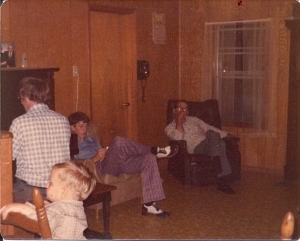
How we all were in the presence of real music. Mr. McGee’s playing brought everyone indoors and to a chair. All-out wonder.
Although I was increasingly skilled, I developed habits in practice that drove my mother up a slick wall. For one thing, I wouldn’t play past a mistake. Ever. If I made one bobble, I’d stop and start all over again. This terrified (and likely also annoyed) my mother. She was the adult in our natal family who came to my recitals, usually bringing along some other relatives, but they were big deals to her. At Jones, the three uprights would be hauled onto the stage alongside the baby grand, and the auditorium would be full. We practiced not just our pieces but timing and presence and so on for weeks ahead. Mama lived haunted by the fear that—because of my obstinate, error-free aim when practicing—I would miss a note up on that stage and not have the ability to do anything but start all over again. “I would just fall through the floor,” she would say to me when I was re-starting a piece for the humpteenth time in her living room. “Your muscles are learning to stop,” she would add.
It wasn’t true, of course. I didn’t bobble in recitals. Crowds of people frightened me, but with the piano I could forget they were there, and when you’re all dressed up and that high above everybody else? You don’t miss notes. Period. That would drag things out in an unacceptable manner, and I abhorred the empty feeling the auditorium got when some kid would miss a note and get flustered trying to find it again. I never missed notes on a stage, but my mother never got to where she could trust that. She’d be standing up with all the rest of the people at the end of my performances, clapping like crazy, and to hear her tell it later (or before), she had to clap to keep from passing out, because she had heard me practice at home and thus had to be fully prepared to fall through that floor even if there was a miracle and I made it through without flubbing the notes and giving her cause.
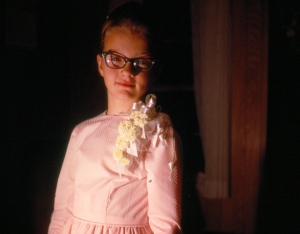
Me, early recital. Corsages are a deeply wrong-headed notion, by the way, for anyone (like a pianist) who needs to turn her head.
This was actually quite entertaining to me. I even got to where I would play a piece flawlessly in practice, knowing my mother was listening in from the kitchen or utility room, and then suddenly I’d stop and start all over again, and I’d hear her sharp intake of breath. The closer we got to recitals, the sharper the breaths she would take (and the more likely she would be to shout out to me to please not do this). For recitals, too, when I would raise my hands from my lap to hover them over the keys for the obligatory three full seconds before the opening notes? I would sometimes draw out the count—adding syllables to the words like any good southerner would, and just for the benefit of my mother. As it turned out, I was developing a fair amount of stage presence without even understanding it. But the piano itself—that’s all that was real for me up there. By high school I was playing in competitions in far-off Jackson, and beginning to feel some mastery (which is, by the way, a far better tactic for retention of knowledge than any test could ever be).
I was a student in Mrs. Toney’s studio long after Jones closed its doors and she moved into her home (which was equipped with a full-size organ, too) and until my penultimate year in high school, when she informed me that she’d taught me all she could and I needed to change teachers. For all our years together, I would listen to her play pieces for her older students—far beyond my technical abilities—and then go home and work those pieces out by ear. But she kept her word from that first spring and would not play for me. My final recital was a doozy, though, with me the oldest and most skilled of her students, and both of us near to tears just thinking about it, and she decided that we would play a duet together.
She also relented and played my final recital piece for me in part because it would be “our last time at this, and technically you are not my student anymore either”; in part, I believe, because she got great pleasure in life from playing our pieces for us as they should be played and had missed doing this for me (for my own good, yes, but still); and in part because she’d asked me to play Adieu to the Piano this time, even though I was well and thoroughly beyond it by then. She wanted, she said, with a quick turning away to hide her tears, “to say this to you with these 88 keys.”
In the recital, I nailed that piece—playing toward the woman who no longer used blue rinse in her white hair but who had cried for me leaving already once—and then we played Concertina on Familiar Tunes for our duet together, and at the end I got a smile and a hug from her, too, all of which lessened the sting of being dropped from her rolls. (Somewhere I have a photo of us, which I shall upload here on finding, just for the record.) I then moved on to the woman Mrs. Toney had referred me to: a Miss Grace Lane Leggett, a legend in our town and county and across the state line to boot, and that is where I shall pick up this tale next Sunday.
For now I must ready myself for the bar. I’ve been playing off the top of my head since I started this a couple or so months ago, but now that people look forward to it, I need to start making a set list. It’ll stay informal, nowhere near Jones, but serve its purposes, as the piano always has. This is the power of the 88 keys: it makes bridges between us and strangers. And loved ones. It reminds me every day I breathe that these dearest ones from my past still live within me. Because of them my life is vastly richer than it could otherwise have been. Mammaw Kate, who had the vision in the first place. Mama, who had the guts to face down her stubborn-as-tempered-steel firstborn until that lass could find her talent to steer by. Mrs. Jessie Toney, who styled my pianist soul in such a way that I could glide between two opposing banks and not get hung up on either. And Mr. Jackie McGee, who saw how I learned in this world and valued it enough to say so. I cannot imagine my life without any one of them.

